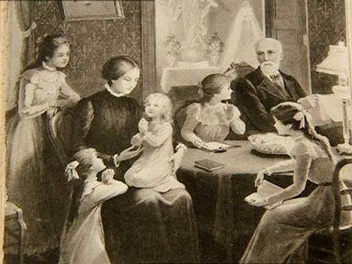A cab was soon seen jolting over the ill-paved streets, passing by the old Norman houses, the picturesque medieval appearance of which gives the town a poetic touch in striking contrast to the black smoke rising from the tall factory chimneys. The cab stopped at the Place St. Pierre near the ancient Cathedral of the same name. A few inquisitive heads appeared at the windows, and some loiterers stood still to look at the newcomers.
The first to alight was a man about fifty. A little girl jumped out after him, and put her hand confidingly in his. A tall brown-haired girl came next followed by another, small and frail, and two younger children. They formed a charming group, but the shyness visible on all the young faces, together with their deep mourning, made the passersby look at them sympathetically and say to one another: "Poor children! they have probably just lost their mother."
The door of the house before which this interesting family had alighted now opened, and two little girls rushed out, followed more sedately by their parents. For a few moments nothing was to be heard but delighted exclamations from the children, and the more sober greetings of their elders.
You w i l l easily have recognized the family I have described. The tall white-haired gentleman is Monsieur Martin, the father of Therese. But perhaps you would like to have a few more details about his children.
Marie, the eldest, was then in her eighteenth year. Hers was a sunny and affectionate nature. She was tenderly devoted to her sisters, who loved her dearly in return. Her father called her his "Diamond," because she was always sparkling with fun and originality.
Pauline, aged sixteen, had just left school. She was shy and gentle, and her father's name for her was "Precious Pearl." But beneath her sweetness and her retiring ways was hidden remarkable force of will and judgment unusually well balanced. Marie, who since her mother's death had become mistress of the house, although herself possessing rare gifts of mind and heart, often had recourse to Pauline's advice in domestic affairs.
After Pauline came Leonie, aged thirteen. She too was gentle and retiring, her loving nature prompting her to constant unselfishness and self-effacement.
Celine was just eight, and somewhat shy, though her eyes danced with mischief, and she was full of life and spirits.
Therese, the little fair-haired Queen, was five. She won all hearts by her charming ways and her bright smile.
The four that came out to welcome the newcomers were Monsieur Guerin, brother-in-law of Monsieur Martin, his wife, and their two little daughters. Jeanne, the elder, a very intelligent child, was about the same age as Celine. Dark-eyed Marie, two years older than Therese, was a great rogue, and something of a tomboy.
This was the family which was henceforward to play so large a part in the life of Therese.
A printable file of this chapter as well as a coloring picture can be found below:
|
| ||||

 RSS Feed
RSS Feed